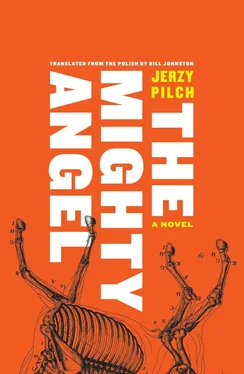“You’ll get half a glass of Becherovka in just a moment”—the voice I heard was also incontrovertibly real, nor did it contain any ambiguous tonality, any ruffianly harshness or high-pitched devilry; it was the deep, agreeable voice of a reputable physician. The materiality of this almost-baritone brought nearly as much relief as the promise it had uttered. That’s right, with a drunkard’s obstinacy I repeat once again: the materiality of the situation was a relief to me, for I had been excessively tormented by an incessant onslaught of fictitiousness.
“You’ll get half a glass of Becherovka in just a moment. I’m sure there’s no need to remind such a seasoned master of the art of imbibition that you have to drink cautiously and very slowly, otherwise you’ll bring about what in Old Poland they used to call an ignoble vomitation, and that would be, first, an irreparable disgrace in the presence of a lady, and second, the permanent loss of a significant quantity of life-giving substance.”
It was true, there was no need for him to instruct me. Knowing that in a few minutes a subtle reconstruction of body and soul awaited me, I raised myself to a sitting position; with the greatest caution (not devoid of an element of worship) I took in both hands the glass that had been promised and that, in accordance with said promise, was indeed half full, and I set about moistening my lips and wetting my throat, and, restraining my need for immediate salvation, I settled for a salvation that was gradual. And slowly, slowly the unbearable burden lifted from my heart, my dark thoughts brightened, and my soul was cheered.
“Is that better?” asked my savior, and I, like a receptive apprentice instantly grasping the teachings of the master, replied:
“That’s better.”
After a few minutes, when I was sufficiently improved that I could finally discontinue the hysterical overuse of biblical phraseology to myself, I looked at them all with absolute lucidity and asked the most natural and thoroughly sober question in the world:
“Pardon me, gentlemen, but to what do I owe the pleasure of this visit? Where in heaven’s name did you come from, and how did you get in?”
“It’s better, but that doesn’t mean it’s good,” said the one who seemed to be my only interlocutor, a matter-of-fact solicitude in his voice. “First of all, it’s not only gentlemen. Actually, it’s very odd that you of all people, with your reputation as a supposed connoisseur of the fair sex, haven’t noticed there’s a girl present. Alberta, show the gentleman your femininity.”
The most spectral member of the trio rose wordlessly from the armchair and with the unhurried movements of an experienced stripper started unbuttoning the mysterious garment — upon closer inspection it lost much of its mystery and turned out to be something between a light coat and a heavy gown with a hood. In a moment there stood before me a beautiful, graceful, tall brunette in a melodramatically scornful pose; she was wearing a yellow dress with spaghetti straps.
“Alberta Lulaj, poetess,” came the introduction, though who the speaker actually was I could not figure out. The chief intruder? Master of an inscrutable ceremony? My benefactor? Or maybe some reprobate wanted by the police?
“We’re here about her, about her under-appreciated poems. As for the other matters, first, we entered with the aid of the key that you in your drunken abandon left in the lock, and second, we’re old acquaintances. That is, you may not recognize us, you’re entitled not to remember, but I recognize you and I remember. The name’s Józef Cieślar and once, once, forty years ago or more, we were at Sunday School together. I hardly need add that after we left Sunday School our paths diverged. You went to the big city and got an intellectual education, while I stayed in our native region and earned a living in various occupations, none of them of an intellectual character.”
At this juncture it would have been beautiful if a gate, overgrown with dark weeds of forgetfulness, had opened up in my mind, if I had suddenly remembered flaxen-haired Józef Cieślar, who was incapable for love or money of memorizing even the shortest Lutheran psalm — it would have been not just a beautiful but also a classic scene. I, however, I confess frankly, drew a blank. I looked at this alleged Józef Cieślar and no gate opened in my mind, I did not remember anything, nor did I recognize him in the slightest, to the point that everything he said seemed to me a manifest pack of lies serving a purpose that for the moment remained hidden but was without a doubt of a criminal nature. As it happened this impostor, this stealer of biographies, evidently knew rather a lot about me; he even seemed to know certain details of my soul. He evidently knew, for instance, that when I heard about Sunday School I’d be sure to get all emotional in my drunkenness, that I might even burst out in drunken tears. Yet I kept my emotions in check and did not burst out crying; I gave no sign of what I was feeling, while he too did not intensify the incitement he had begun, he did not look at me expectantly, and he continued his introductions with an unchanging matter-of-factness.
“My associate, on the other hand”—with an almost elegant gesture of his hand he indicated the second gangster, who was standing a few feet away—“my associate, on the other hand, doesn’t know you personally but is a great admirer of yours. He read your article in the newspaper.”
My alleged admirer nodded and with feigned eagerness confirmed this:
“That’s right, I’m not someone who is generally inclined to fascination, but in this case I was fascinated.”
I decided to probe the matter more deeply and, partly out of cunning, partly out of vanity, I asked:
“I’m most curious — that is, I’m flattered, but at the same time I’m most curious — which of my pieces made such a very favorable impression on you?”
The other man shrugged his shoulders in a familiar gesture of helplessness and said with a straightforwardness that was equally familiar:
“I don’t remember what it was about, but I remember I almost split my sides laughing.”
I flinched as if struck by a whip. The chief intruder gave me a sympathetic look, the poetess Alberta Lulaj pretended to be absorbed by an over-tight or perhaps over-loose spaghetti strap, and there was an embarrassing silence. When the embarrassing silence passed, the cordial voice sounded once again.
“You continue to impress me with the extent of your ruination; you ought to know you should never quiz your readers on their knowledge of your work, you should be pleased at even the most general existence of readers, and leave it at that. Though that’s not important. Let’s get back, or rather let’s get down, to the heart of the matter. Before you stands the beautiful and wise Alberta. Not only is she standing before you; over the next few hours, and if need be over the next few days, she will remain with you. My associate and I will withdraw in literally a minute; aside from everything else, as usual we have urgent business in town. We are going, Alberta is staying. I’m leaving you the bottle too. That’s right,” repeated the purported Józef Cieślar with emphasis, “I’m leaving you the bottle. In other words”—here he raised a finger in a meaningful, schoolmasterly gesture that was uncannily reminiscent of Christopher Columbus the Explorer—“in other words, you are being left with a woman and a bottle; observe that it’s as if you had entered paradise without remotely deserving it. Later on Alberta will help you recover yourself; she’ll soothe your troubled nerves, make you some nourishing broth, feed you fruit juice rich in vitamins, and in the last resort will pop down to the store for the last two life-saving beers. You in return. .”
Читать дальше












